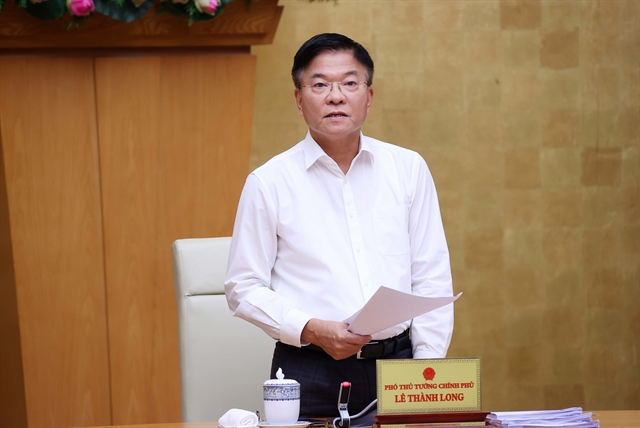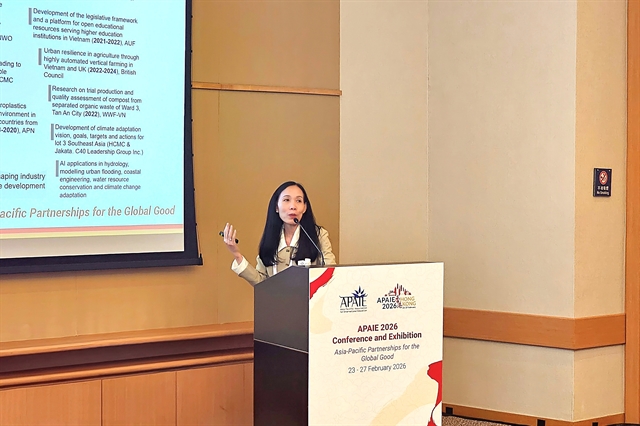 Politics & Law
Politics & Law


|
| Deputy Prime Minister Lê Thành Long chairs and concludes the session. — VNA/VNS Photo Văn Điệp |
HÀ NỘI — Deputy Prime Minister Lê Thành Long has requested solutions for digital transformation as well as building a culture of legal compliance while chairing a meeting of the Central Law Education and Dissemination Coordination Council.
It was the council’s first meeting after its merger, taking place on Friday afternoon under the chair of Deputy PM Long, who is also chairman of the council.
Digital transformation in legal education
The Prime Minister’s Decision No 26/2025/QĐ-TTg issued in August this year regulates composition, duties and powers of the council, merging the Central Law Education and Dissemination Coordination Council with the Interagency Council on Legal Aid in Litigation.
At the meeting, Deputy Minister of Justice Nguyễn Thanh Ngọc, Deputy Chairman of the council, reported that in the first nine months this year, legal dissemination and education nationwide achieved many outstanding results.
Ministries, sectors and localities issued 40 directive and guidance documents; organised over 216,000 direct communication activities attracting nearly 24 million participants.
They also conducted nearly 5,000 legal knowledge contests with more than 2.2 million contestants and distributed over 16 million legal education materials.
Nationwide, as many as 16,630 legal aid cases were handled, a 21-per-cent increase compared to the same period last year.
The Ministry of Justice (MoJ), as the council’s standing agency, advised the PM to approve the Digital Transformation Project in legal dissemination and education for the 2025-2030 period.
The National Legal Portal has been operational for four months, from June 1 to August 31. It received nearly 660,000 visits and answered 156,000 legal-related questions via artificial interlligence (AI) applications.
Contributing to the discussion, Minister of Justice Nguyễn Hải Ninh noted that with the two-tier local government, the workload was heavy, especially at the commune level, which faced many new tasks and new legal documents.
In recent times, training sessions, issuing documents and sending officials directly to grassroots levels have been implemented, but these efforts need to continue, especially at the commune level, to ensure effective law enforcement so that citizens and businesses can understand regulations and smoothly exercise their legal rights and obligations.
From the local perspective, a representative from Đồng Nai southern province stated that digital transformation was a prerequisite while conducting two-tier local government.
The representative proposed that this year’s Việt Nam Law Day theme focus on digital transformation in law and in legal publicity, dissemination and education, as well as developing applications for searching legal information and regulations.
During the meeting, several opinions suggested strengthening the monitoring of actual situations, removing difficulties, guiding the legal dissemination and education.
They also wanted to provide legal support to citizens, small and medium enterprises, business households and individual businesses, particularly under the two-tier local government system.
Tô Hoài Nam, Standing Deputy Chairman and General Secretary of the Việt Nam Small and Medium Enterprise Association, emphasised that legal information and dissemination to people and businesses must be “simplified and easy to understand” with diverse communication channels.
Accordingly, he proposed that enterprises, business households, and citizens should have channels for “questions when they do not understand,” a two-way interactive channel with authorities regarding legal regulations, especially newly issued ones.
Authorities and those responsible for communication and education should proactively reach out to those who need to grasp legal regulations.
Culture of legal compliance
Concluding the meeting, Deputy PM Long noted that recently, the Politburo issued Resolution No 66-NQ/TW on innovating lawmaking and law enforcement to meet the country’s developmental demands in the new era, which clearly focuses on building a culture of legal compliance.
This is regarded as a revolution in lawmaking and enforcement work.
The Deputy PM acknowledged highlights in legal dissemination and education, such as digital transformation and information technology application.
Policy communication has directly entered people’s daily lives.
A large volume of legal normative documents has been amended and supplemented in a very short time to operate the two-tier local government system.
However, according to the Deputy PM, certain limitations remain, such as shortcomings in realising legal education at training institutions, legal aid and legal support for small and medium-sized enterprises.
Guidance on legal education and application has sometimes been untimely, and there are still many issues to resolve in applying information technology.
Looking ahead, Deputy PM Long requested the MoJ, as the council’s standing agency, to propose solutions, introduce experts and determine the financial mechanisms for developing and carrying out a policy communication programme on major national press agencies.
The MoJ is to lead the research, development and submission to the PM about a project on building a culture of legal compliance among officials, State workers and the people, following the PM’s directives.
It will also take charge of closely coordinating with relevant ministries and agencies to successfully organize the Việt Nam Law Day Ceremony 2025 and continue to effectively operate the National Legal Portal.
The Ministry of Home Affairs will focus on developing a legal knowledge training and updating programme for officials and public employees, to be deployed starting next year.
The Ministry of Education and Training will study integrating content on the Constitution, laws and rules into training curricula and programmes. — VNS




